
Trivial Pursuit is a board game in which winning is determined by a player's ability to answer trivia and popular culture questions. Players move their pieces around a board, the squares they land on determining the subject of a question they are asked from a card. Each correct answer allows the player's turn to continue; a correct answer on one of the six "category headquarters" spaces earns a plastic wedge which is slotted into the answerer's playing piece. The object of the game is to collect all six wedges from each "category headquarters" space, and then return to the center "hub" space to answer a question in a category selected by the other players.

Balderdash is a board game variant of a classic parlour game known as Fictionary or the Dictionary Game. It was created by Laura Robinson and Paul Toyne of Toronto, Ontario, Canada. The game was first released in 1984 by the Canada Games Company. A US edition appeared that year from TSR, Inc., copyrighted to Gameworks Creations, Inc. and licensed from Canada Games. Subsequent editions have appeared from a variety of commpanies including The Games Gang, Hasbro and Mattel. The game has sold over 15 million copies worldwide to date. It is aimed at fans of word games, such as Scrabble.

Sorry! is a board game that is based on the ancient Indian cross and circle game Pachisi. Players move their three or four pieces around the board, attempting to get all of their pieces "home" before any other player. Originally manufactured by W.H. Storey & Co in England and now by Hasbro, Sorry! is marketed for two to four players, ages 6 and up. The game title comes from the many ways in which a player can negate the progress of another, while issuing an apologetic "Sorry!"
The Mad Dash is a television game show created by Sidney M. Cohen which first appeared in 1978 on Canada's CTV network and ran until 1981. The series proved to be a family favourite based on Canada's BBM ratings, and was also popular in parts of the northern United States, where CTV affiliates were available to Americans living near the Canada–United States border, both over the air and via cable. Pierre Lalonde was the MC, and Nick Hollinrake was the announcer for the show, which was taped at the studios of CFCF-TV in Montreal. This classic series is included in the collection of Canadian icons in the 2006 feature film Souvenir of Canada based on the book by Douglas Coupland. The series was later rerun on GameTV in Canada, from 2007 to 2010.

Eye Guess is an American game show created by Bob Stewart and hosted by Bill Cullen that aired on NBC from January 3, 1966, to September 26, 1969. The game combined a general knowledge quiz with a Concentration-style memory element, in which the answers were shown to the players and their recall of their positions was tested.
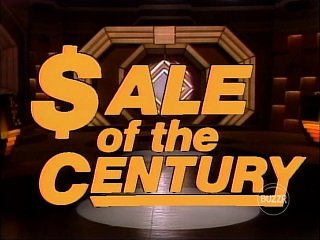
Sale of the Century is an American television game show that originally debuted on September 29, 1969, on NBC daytime. It was one of three NBC game shows to premiere on that date, the other two being the short-lived game shows Letters to Laugh-In and Name Droppers. The series aired until July 13, 1973, and a weekly syndicated series began that fall and ran for one season.
Monopoly is an American television game show based on the board game of the same name. The format was created by Merv Griffin and produced by his production company, Merv Griffin Enterprises.

Scene It? is an interactive film series created by Screenlife Games, in which players answer trivia questions about films or pop culture. The games were first developed to be played with questions read from trivia cards or viewed on a television from an included DVD or based on clips from movies, TV shows, music videos, sports and other popular culture phenomena. Scene It? was released on mobile and console platforms. After discontinuation in 2012, the series was revived in 2022, with streaming functionality replacing DVDs. It is owned by Paramount Pictures since 2008.

High Rollers is an American television game show created by Merrill Heatter. Two contestants compete to answer trivia questions and gain control of an oversized set of dice, which they then roll to eliminate the numbers 1 through 9 from a game board in order to win cash and prizes. It is an adaptation of the standard dice game shut the box.
TriBond is a board game that has sold over 3 million copies in 14 countries since its release in 1990. It requires players to determine a common bond between three subjects. It follows in the tradition of Trivial Pursuit, Outburst and other adult boardgames that require a wide range of knowledge but TriBond requires some problem solving ability as well.
Sale of the Century is an Australian prime time game show that aired on the Nine Network from 14 July 1980 to 29 November 2001. It is based on both Great Temptation that aired from 1970 to 1974 and on the original Sale that first aired in the United States from 1969 to 1973. The Australian format of Sale has since been used internationally, including in a revived US version that aired from 1983 to 1989.

The Ungame is a non-competitive conversation board game created by Rhea Zakich in 1972 and published in 1973. In the game, players move around the board with the aid of a die and answer questions about themselves on cards, while the other players must listen and respond only when prompted.
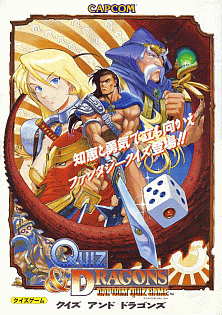
Quiz & Dragons: Capcom Quiz Game is a quiz game released in arcades by Capcom in 1992. The game combines some stylistic elements of role-playing video games such as a fantasy theme and multiple characters with that of board games to create a unique twist to the quiz game genre.
Bookchase is a 2007 board game published by Art Meets Matter. Players compete to acquire six small books for their bookshelf. They do this by partly by answering multiple-choice questions, partly by visiting special spaces on the board: The Bookshop, The Book Corner, The Library and also by chance events triggered by the turn of an Award or Sentence card.
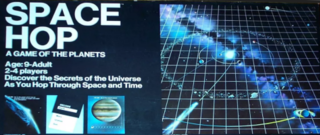
Space Hop is an educational board game about astronomy published by Teaching Concepts in 1973.

Imaginiff is a party-type board game.
Family Game Night is an American television game show based on Hasbro's family of board games and EA's video game franchise of the same name. The show was hosted by Todd Newton. Burton Richardson was the announcer for the first two seasons; he was replaced by Stacey J. Aswad in the third season, and Andrew Kishino was hired for the fourth season. The 60-minute program debuted on October 10, 2010, on The Hub ; it was previewed on October 9, 2010, on its sister channel, TLC. Seasons 1 and 2 contained 26 and 30 episodes respectively. Seasons 3, 4 and 5 each contained 15 episodes. Season 2 premiered on Friday, September 2, 2011, with additional games being added. The games added to the second season included Cranium Brain Breaks, Green Scream, Ratuki Go-Round, Simon Flash, Operation Sam Dunk, Trouble Pop Quiz, and Spelling Bee. However games from the previous season were still kept.
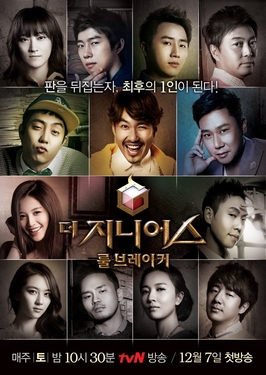
The Genius: Rule Breaker is the second season of The Genius, which debuted on tvN on December 7, 2013.
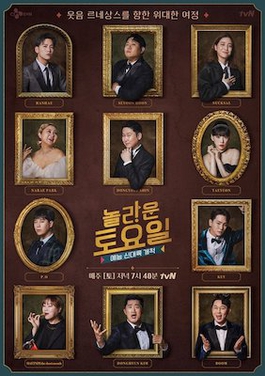
DoReMi Market, better known as Amazing Saturday, is a South Korean variety show that airs every Saturday at 19:40 (KST) on tvN.
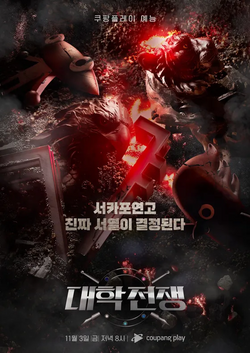
University War also known as Elite League is a South Korean reality game show where students from prestigious universities in South Korea and abroad battle to solve brain quizzes. The first season premiered on November 3, 2023 on Coupang Play. The second season is scheduled to air in the second half of 2024.